Boyle J.A. The Cambridge History of Iran, Volume 5: The Saljuq and Mongol Periods
Подождите немного. Документ загружается.

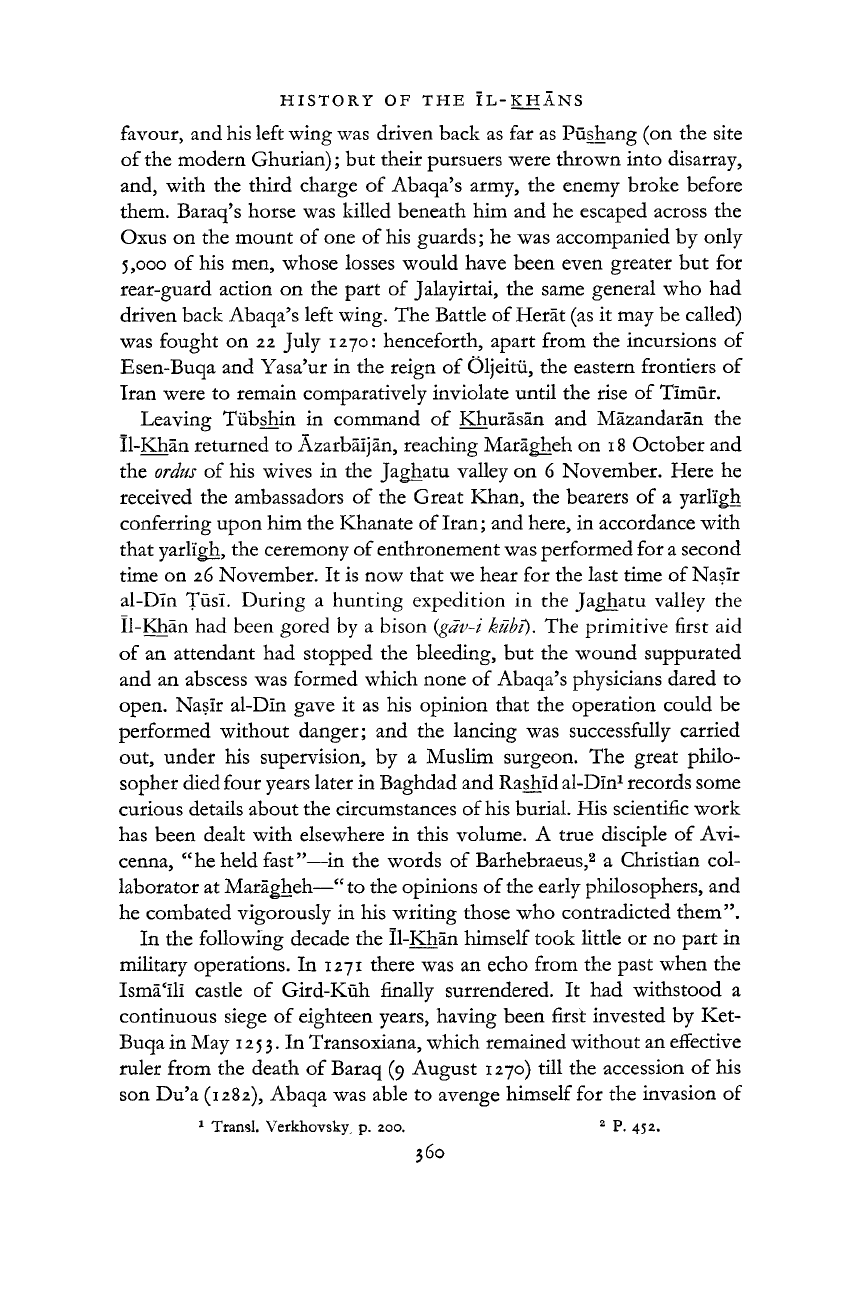
HISTORY
OF THE
IL-KHÂNS
favour, and his left wing
was
driven back
as far as
Püşhang
(on the
site
of the modern Ghurian);
but
their pursuers were thrown into disarray,
and, with
the
third charge
of
Abaqa's army,
the
enemy broke before
them. Baraq's horse
was
killed beneath
him and he
escaped across
the
Oxus
on the
mount
of
one
of
his guards;
he was
accompanied
by
only
5,000
of his men,
whose losses would have been even greater
but for
rear-guard action
on the
part
of
Jalayirtai,
the
same general
who had
driven back Abaqa's left wing.
The
Battle
of
Herat
(as it may be
called)
was fought
on
22 July
1270:
henceforth, apart from
the
incursions
of
Esen-Buqa
and
Yasa'ur
in the
reign
of
Öljeitü,
the
eastern frontiers
of
Iran were
to
remain comparatively inviolate until
the
rise
of
Timur.
Leaving Tiibshin
in
command
of
Khurasan
and
Mazandaran
the
Il-Khân returned
to Azarbaijan,
reaching Marâgheh
on
18 October
and
the ordus
of his
wives
in the
Jaghatu valley
on 6
November. Here
he
received
the
ambassadors
of the
Great Khan,
the
bearers
of a
yarligh
conferring upon
him the
Khanate
of
Iran;
and
here,
in
accordance with
that yarligh,
the
ceremony
of
enthronement was performed
for a
second
time
on
26
November.
It is now
that
we
hear
for the
last time
of
Naşir
al-Dîn Tüsî. During
a
hunting expedition
in the
Jaghatu valley
the
Îl-Khân
had
been gored
by a
bison (gâv~i
kübî).
The
primitive first
aid
of
an
attendant
had
stopped
the
bleeding,
but the
wound suppurated
and
an
abscess
was
formed which none
of
Abaqa's physicians dared
to
open. Naşir al-Din gave
it as his
opinion that
the
operation could
be
performed without danger;
and the
lancing
was
successfully carried
out, under
his
supervision,
by a
Muslim surgeon.
The
great philo-
sopher died four years later
in
Baghdad
and
Raşhid al-Din
1
records some
curious details about
the
circumstances
of
his burial.
His
scientific work
has been dealt with elsewhere
in
this volume.
A
true disciple
of Avi-
cenna,
"he
held fast"—in
the
words
of
Barhebraeus,
2
a
Christian col-
laborator
at
Marâgheh—"
to the
opinions
of
the early philosophers,
and
he combated vigorously
in his
writing those
who
contradicted them".
In
the
following decade
the
Il-Khân himself took little
or no
part
in
military operations.
In
1271
there
was an
echo from
the
past when
the
Isma'ili
castle
of
Gird-Küh finally surrendered.
It had
withstood
a
continuous siege
of
eighteen years, having been first invested
by Ket-
Buqa
in May
12
5
3.
In
Transoxiana, which remained without
an
effective
ruler from
the
death
of
Baraq
(9
August
1270)
till
the
accession
of his
son
Du'a
(1282), Abaqa
was
able
to
avenge himself
for the
invasion
of
1
Transl. Verkhovsky,
p.
200.
2
P. 452.
360
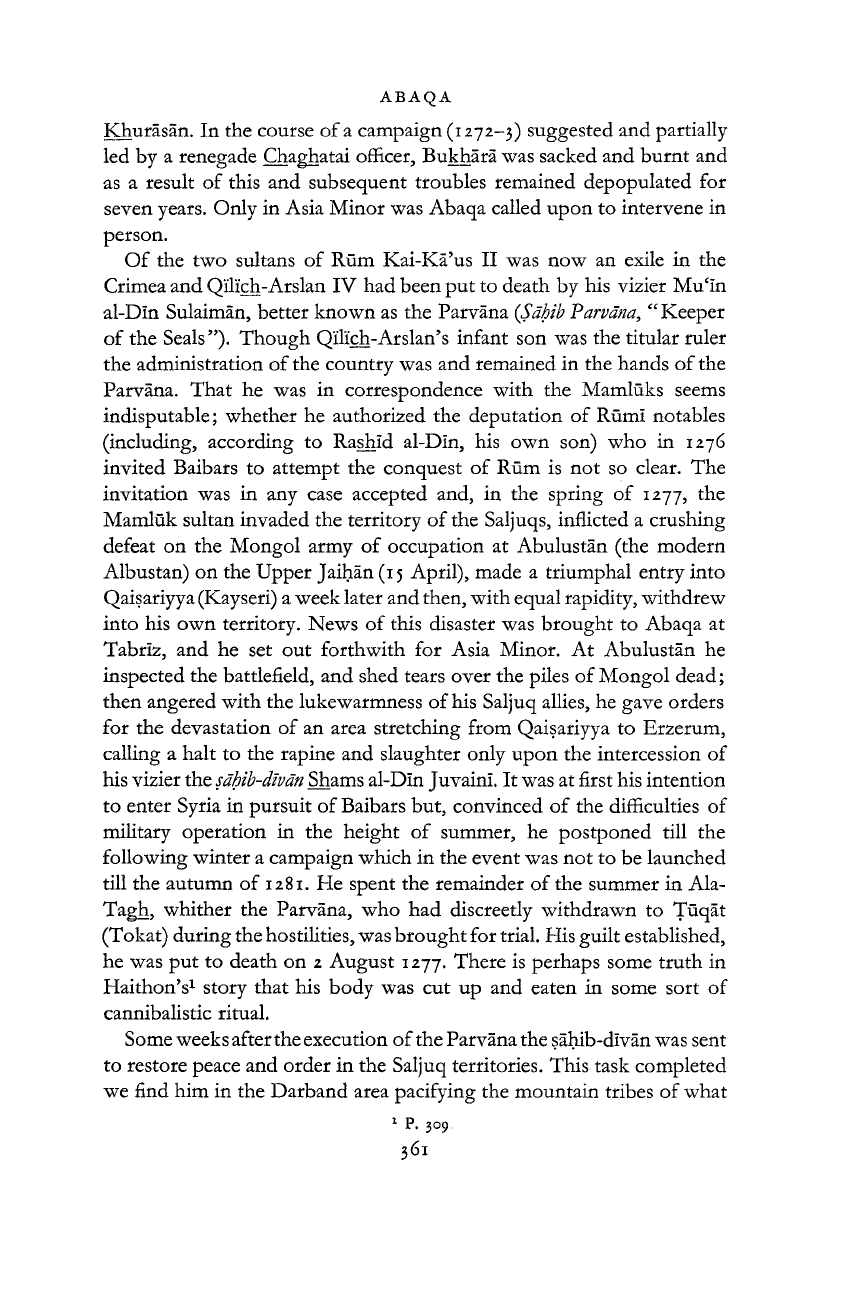
ABAQA
Khurasan. In the course of a campaign (1272-3) suggested and partially
led by a renegade Chaghatai officer, Bukhara was sacked and burnt and
as a result of this and subsequent troubles remained depopulated for
seven years. Only in Asia Minor was Abaqa called upon to intervene in
person.
Of the two sultans of Rum Kai-Ka'us II was now an exile in the
Crimea and Qilich-Arslan IV had been put to death by his vizier Mu'in
al-Din Sulaiman, better known as the Parvana {Sahib Parvana, " Keeper
of the Seals"). Though Qilich-Arslan's infant son was the titular ruler
the administration of the country was and remained in the hands of the
Parvana. That he was in correspondence with the Mamluks seems
indisputable; whether he authorized the deputation of Rumi notables
(including, according to Rashid al-Din, his own son) who in 1276
invited Baibars to attempt the conquest of Rum is not so clear. The
invitation was in any case accepted and, in the spring of
1277,
the
Mamluk sultan invaded the territory of the Saljuqs, inflicted a crushing
defeat on the Mongol army of occupation at Abulustan (the modern
Albustan) on the Upper Jaihan
(15
April), made a triumphal entry into
Qaisariyya (Kayseri) a week later and then, with equal rapidity, withdrew
into his own territory. News of this disaster was brought to Abaqa at
Tabriz,
and he set out forthwith for Asia Minor. At Abulustan he
inspected the battlefield, and shed tears over the piles of Mongol dead;
then angered with the lukewarmness of his Saljuq allies, he gave orders
for the devastation of an area stretching from Qaisariyya to Erzerum,
calling a halt to the rapine and slaughter only upon the intercession of
his vizier the sahib-divan Shams al-Din Juvaini. It was at first his intention
to enter Syria in pursuit of Baibars but, convinced of the difficulties of
military operation in the height of summer, he postponed till the
following winter a campaign which in the event was not to be launched
till the autumn of
1281.
He spent the remainder of the summer in Ala-
Tagh, whither the Parvana, who had discreetly withdrawn to Tuqat
(Tokat) during the hostilities, was brought for trial. His guilt established,
he was put to death on 2 August
1277.
There is perhaps some truth in
Haithon's
1
story that his body was cut up and eaten in some sort of
cannibalistic ritual.
Some weeks after the execution of the Parvana the sahib-divan was sent
to restore peace and order in the Saljuq territories. This task completed
we find him in the Darband area pacifying the mountain tribes of what
1
P. 309
361
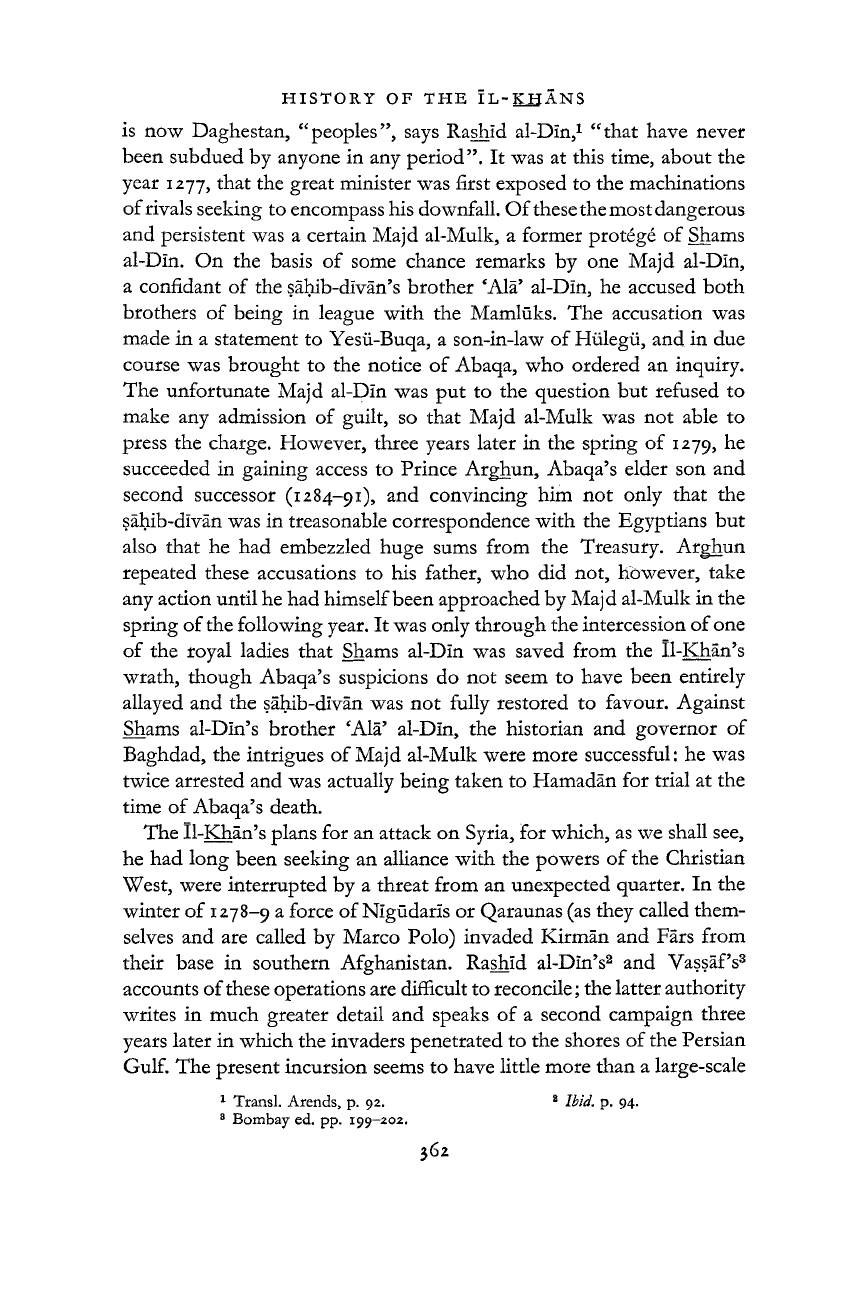
HISTORY OF THE ÎL-KHÂNS
362
is now Daghestan, "peoples", says Rashid al-Din,
1
"that have never
been subdued by anyone in any period". It was at this time, about the
year
1277,
that the great minister was first exposed to the machinations
of rivals seeking to encompass his downfall. Of these the most dangerous
and persistent was a certain Majd al-Mulk, a former protege of Shams
al-Din. On the basis of some chance remarks by one Majd al-Din,
a confidant of the sahib-divan's brother 'Ala' al-Din, he accused both
brothers of being in league with the Mamlûks. The accusation was
made in a statement to Yesù-Buqa, a son-in-law of Hulegu, and in due
course was brought to the notice of Abaqa, who ordered an inquiry.
The unfortunate Majd al-Din was put to the question but refused to
make any admission of guilt, so that Majd al-Mulk was not able to
press the charge. However, three years later in the spring of
1279,
he
succeeded in gaining access to Prince Arghun, Abaqa's elder son and
second successor
(1284-91), and convincing him not only that the
sâhib-divàn was in treasonable correspondence with the Egyptians but
also that he had embezzled huge sums from the Treasury. Arghun
repeated these accusations to his father, who did not, however, take
any action until he had himself been approached by Majd al-Mulk in the
spring of the following year. It was only through the intercession of one
of the royal ladies that Shams al-Din was saved from the Il-Khân's
wrath, though Abaqa's suspicions do not seem to have been entirely
allayed and the sâhib-divân was not fully restored to favour. Against
Shams al-Din's brother 'Alà' al-Din, the historian and governor of
Baghdad, the intrigues of Majd al-Mulk were more successful: he was
twice arrested and was actually being taken to Hamadân for trial at the
time of Abaqa's death.
The Il-Khân's plans for an attack on Syria, for which, as we shall see,
he had long been seeking an alliance with the powers of the Christian
West, were interrupted by a threat from an unexpected quarter. In the
winter of
1278-9
a force of Nigudaris or Qaraunas (as they called them-
selves and are called by Marco Polo) invaded Kirmàn and Fârs from
their base in southern Afghanistan. Rashid al-Din's
2
and Vassaf's
3
accounts of these operations are difficult to reconcile ; the latter authority
writes in much greater detail and speaks of a second campaign three
years later in which the invaders penetrated to the shores of the Persian
Gulf.
The present incursion seems to have little more than a large-scale
1
Transi. Arends, p. 92.
2
Ibid. p. 94.
8
Bombay ed. pp. 199-202.
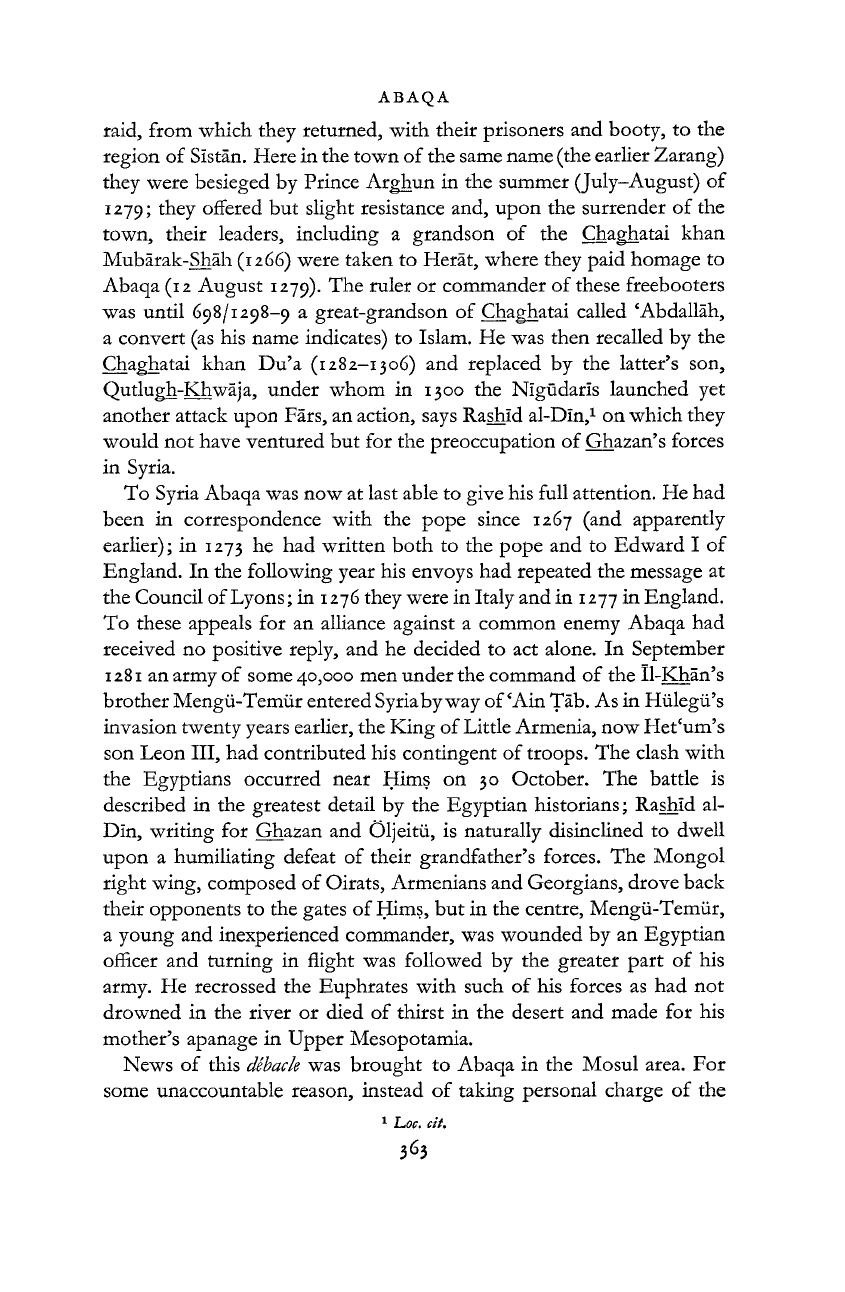
ABAQA
raid, from which they returned, with their prisoners and booty, to the
region of Sistan. Here in the town of the same name (the earlier Zarang)
they were besieged by Prince Arghun in the summer (July-August) of
1279;
they offered but slight resistance and, upon the surrender of the
town, their leaders, including a grandson of the Chaghatai khan
Mubarak-Shah (1266) were taken to Herat, where they paid homage to
Abaqa (12 August 1279). The ruler or commander of these freebooters
was until
698/1298-9
a great-grandson of Chaghatai called 'Abdallah,
a convert (as his name indicates) to Islam. He was then recalled by the
Chaghatai khan Du'a
(1282-1306)
and replaced by the latter's son,
Qutlugh-Khwaja, under whom in
1300
the Nigudaris launched yet
another attack upon Fars, an action, says Rashid al-Din,
1
on which they
would not have ventured but for the preoccupation of Ghazan's forces
in Syria.
To Syria Abaqa was now at last able to give his full attention. He had
been in correspondence with the pope since 1267 (and apparently
earlier);
in
1273
he had written both to the pope and to Edward I of
England. In the following year his envoys had repeated the message at
the Council of Lyons; in
1276
they were in Italy and in
1277
in England.
To these appeals for an alliance against a common enemy Abaqa had
received no positive reply, and he decided to act alone. In September
1281 an army of some 40,000 men under the command of the Il-Khan's
brother Mengu-Temur entered Syria by way of 'Ain Tab. As in Hulegu's
invasion twenty years earlier, the King of Little Armenia, now Het'um's
son Leon III, had contributed his contingent of troops. The clash with
the Egyptians occurred near Hims on 30 October. The battle is
described in the greatest detail by the Egyptian historians; Rashid al-
Din, writing for Ghazan and Oljeitu, is naturally disinclined to dwell
upon a humiliating defeat of their grandfather's forces. The Mongol
right wing, composed of Oirats, Armenians and Georgians, drove back
their opponents to the gates of Hims, but in the centre, Mengu-Temiir,
a young and inexperienced commander, was wounded by an Egyptian
officer and turning in flight was followed by the greater part of his
army. He recrossed the Euphrates with such of his forces as had not
drowned in the river or died of thirst in the desert and made for his
mother's apanage in Upper Mesopotamia.
News of this debacle was brought to Abaqa in the Mosul area. For
some unaccountable reason, instead of taking personal charge of the
1
Loc. cit,
363
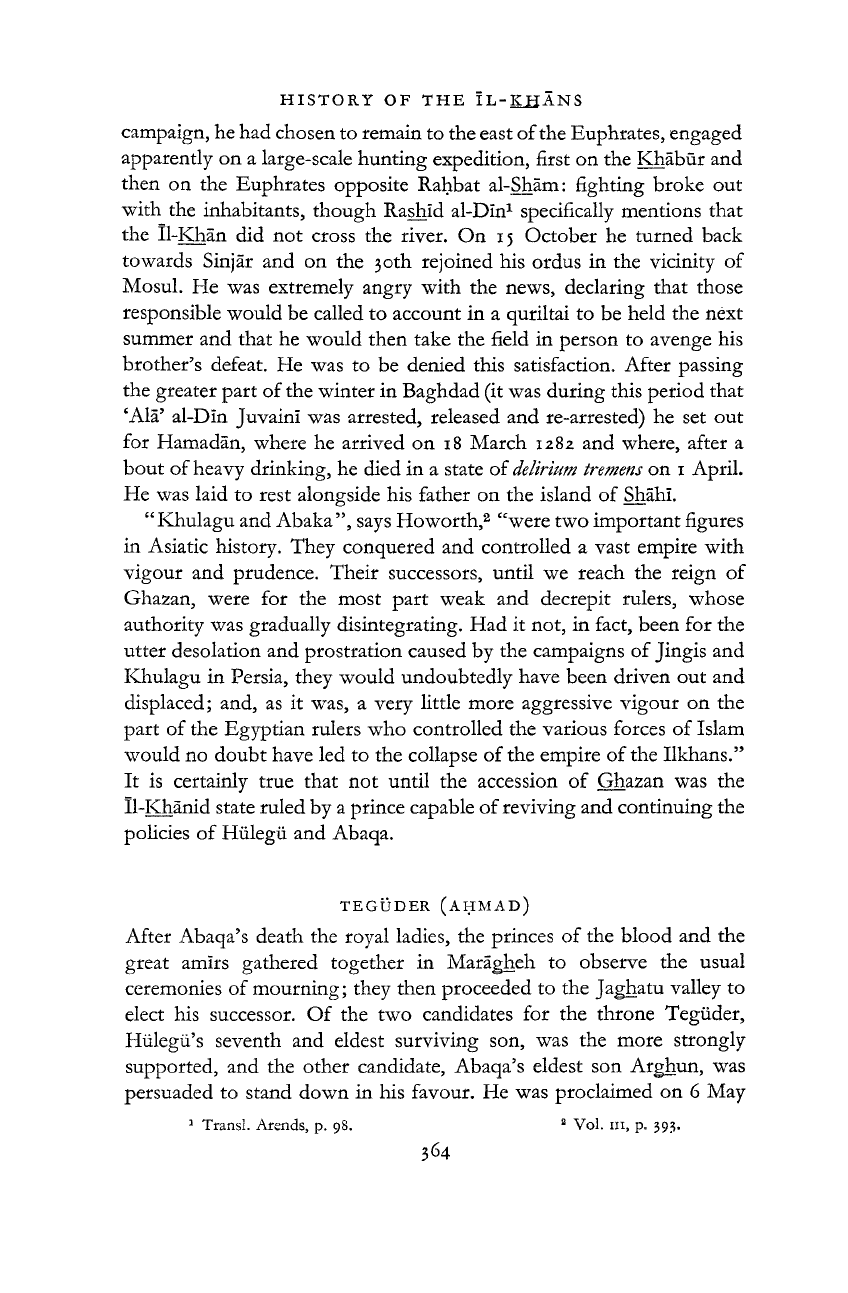
HISTORY OF THE IL-KHANS
TEGUDER (AHMAD)
After Abaqa's death the royal ladies, the princes of the blood and the
great amirs gathered together in Maragheh to observe the usual
ceremonies of mourning; they then proceeded to the Jaghatu valley to
elect his successor. Of the two candidates for the throne Teguder,
Hiilegii's seventh and eldest surviving son, was the more strongly
supported, and the other candidate, Abaqa's eldest son Arghun, was
persuaded to stand down in his favour. He was proclaimed on 6 May
1
Transl. Arends, p. 98.
2
Vol. in, p. 393.
364
campaign, he had chosen to remain to the east of the Euphrates, engaged
apparently on a large-scale hunting expedition, first on the Khabur and
then on the Euphrates opposite Rahbat al-Sham: fighting broke out
with the inhabitants, though Rashid al-Din
1
specifically mentions that
tne
Il-Khan did not cross the river. On 15 October he turned back
towards Sinjar and on the
30th
rejoined his ordus in the vicinity of
Mosul. He was extremely angry with the news, declaring that those
responsible would be called to account in a quriltai to be held the next
summer and that he would then take the field in person to avenge his
brother's defeat. He was to be denied this satisfaction. After passing
the greater part of the winter in Baghdad (it was during this period that
'Ala' al-Din Juvaini was arrested, released and re-arrested) he set out
for Hamadan, where he arrived on 18 March
1282
and where, after a
bout of heavy drinking, he died in a state of delirium tremens on 1 April.
He was laid to rest alongside his father on the island of Shahi.
" Khulagu and Abaka", says Ho worth,
2
"were two important figures
in Asiatic history. They conquered and controlled a vast empire with
vigour and prudence. Their successors, until we reach the reign of
Ghazan, were for the most part weak and decrepit rulers, whose
authority was gradually disintegrating. Had it not, in fact, been for the
utter desolation and prostration caused by the campaigns of Jingis and
Khulagu in Persia, they would undoubtedly have been driven out and
displaced; and, as it was, a very little more aggressive vigour on the
part of the Egyptian rulers who controlled the various forces of Islam
would no doubt have led to the collapse of the empire of the Ilkhans."
It is certainly true that not until the accession of
Ghazan was the
Il-Khanid state ruled by a prince capable of reviving and continuing the
policies of Hiilegii and Abaqa.
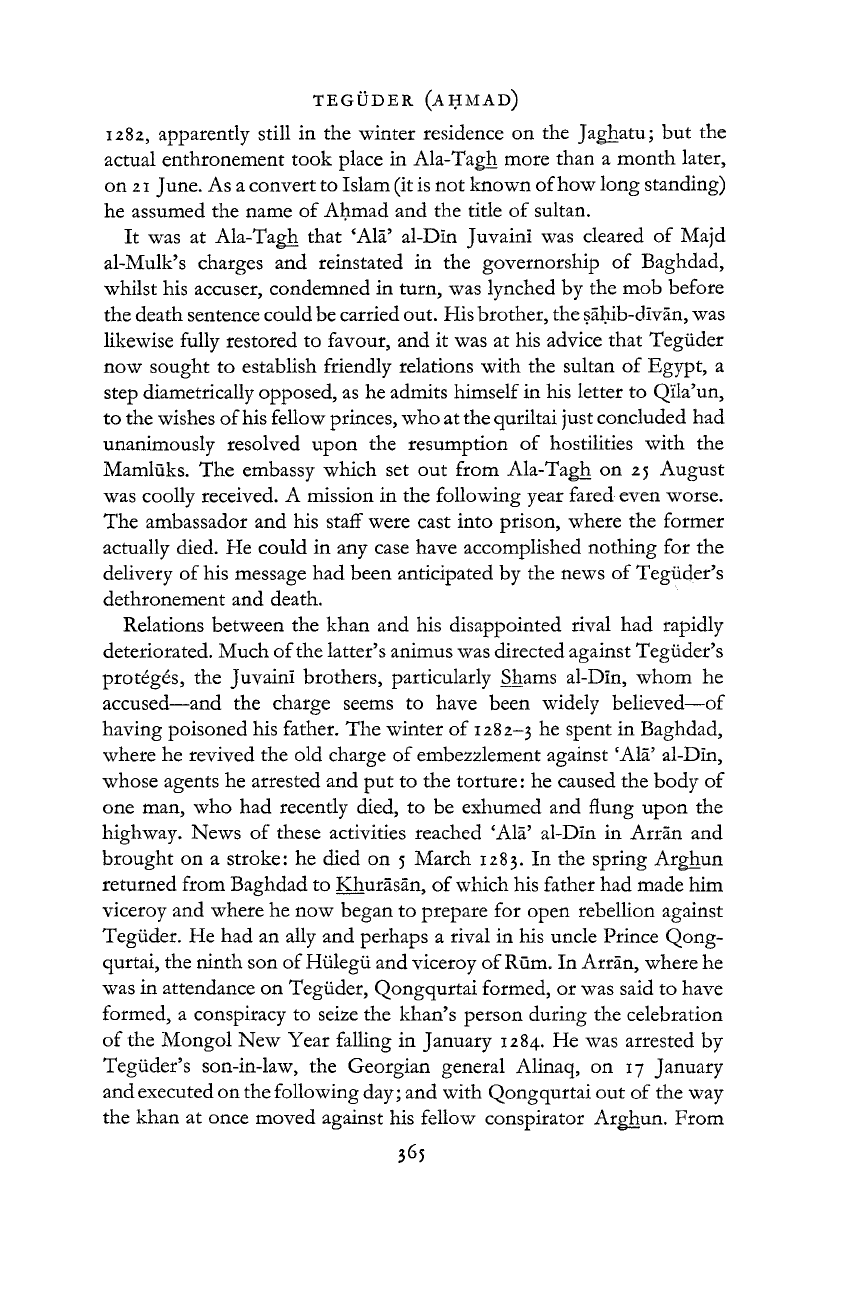
TEGÛDER (AHMAD)
1282,
apparently still in the winter residence on the Jaghatu; but the
actual enthronement took place in Ala-Ta
gh more than a month later,
on
21
June. As a convert to Islam (it is not known of how long standing)
he assumed the name of Ahmad and the title of sultan.
It was at Ala-Tagh that
c
Ala' al-Din Juvaini was cleared of Majd
al-Mulk's charges and reinstated in the governorship of Baghdad,
whilst his accuser, condemned in turn, was lynched by the mob before
the death sentence could be carried out. His brother, the
sâhib-divân, was
likewise fully restored to favour, and it was at his advice that Tegûder
now sought to establish friendly relations with the sultan of Egypt, a
step diametrically opposed, as he admits himself in his letter to Qïla'un,
to the wishes of his fellow princes, who at the quriltai just concluded had
unanimously resolved upon the resumption of hostilities with the
Mamluks. The embassy which set out from Ala-Ta
gh on 25 August
was coolly received. A mission in the following year fared even worse.
The ambassador and his staff were cast into prison, where the former
actually died. He could in any case have accomplished nothing for the
delivery of his message had been anticipated by the news of Teguder's
dethronement and death.
Relations between the khan and his disappointed rival had rapidly
deteriorated. Much of the latter's animus was directed against Teguder's
proteges, the Juvaini brothers, particularly Shams al-Din, whom he
accused—and the charge seems to have been widely believed—of
having poisoned his father. The winter of
1282-3
ne
s
P
ent
m
Baghdad,
where he revived the old charge of embezzlement against
c
Alâ' al-Din,
whose agents he arrested and put to the torture
:
he caused the body of
one man, who had recently died, to be exhumed and flung upon the
highway. News of these activities reached 'Ala' al-Din in
Arrân and
brought on a stroke: he died on 5 March
1283.
In the spring Arghun
returned from Baghdad to Khurasan, of which his father had made him
viceroy and where he now began to prepare for open rebellion against
Tegûder. He had an ally and perhaps a rival in his uncle Prince Qong-
qurtai, the ninth son of Hiilegu and viceroy of Rum. In Arrân, where he
was in attendance on
Tegûder, Qongqurtai formed, or was said to have
formed, a conspiracy to seize the khan's person during the celebration
of the Mongol New Year falling in January
1284.
He was arrested by
Teguder's son-in-law, the Georgian general Alinaq, on 17 January
and executed on the following day; and with Qongqurtai out of the way
the khan at once moved against his fellow conspirator Arghun. From
365
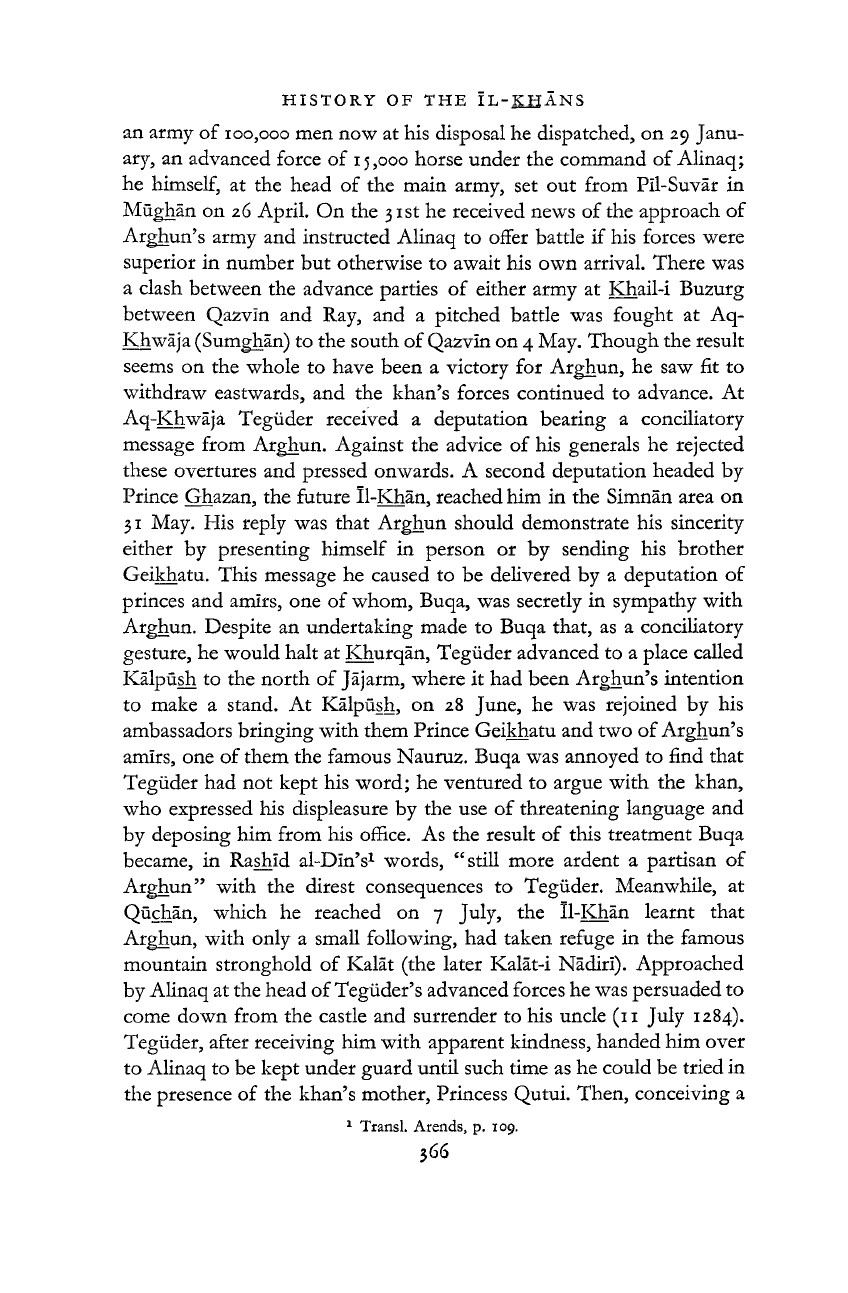
HISTORY OF THE IL-KHANS
an army of 100,000 men now at his disposal he dispatched, on 29 Janu-
ary, an advanced force of
15,000
horse under the command of Alinaq;
he himself, at the head of the main army, set out from Pil-Suvar in
Mughan on 26 April. On the
31st
he received news of the approach of
Arghun's army and instructed Alinaq to offer battle if his forces were
superior in number but otherwise to await his own arrival. There was
a clash between the advance parties of either army at Khail-i Buzurg
between Qazvin and Ray, and a pitched battle was fought at Aq-
Khwaja (Sumghan) to the south of Qazvin on 4 May. Though the result
seems on the whole to have been a victory for Arghun, he saw fit to
withdraw eastwards, and the khan's forces continued to advance. At
Aq-Khwaja Tegiider received a deputation bearing a conciliatory
message from Arghun. Against the advice of his generals he rejected
these overtures and pressed onwards. A second deputation headed by
Prince Ghazan, the future Il-Khan, reached him in the Simnan area on
31
May. His reply was that Arghun should demonstrate his sincerity
either by presenting himself in person or by sending his brother
Geikhatu. This message he caused to be delivered by a deputation of
princes and amirs, one of whom, Buqa, was secretly in sympathy with
Arghun. Despite an undertaking made to Buqa that, as a conciliatory
gesture, he would halt at Khurqan, Tegiider advanced to a place called
Kalpush to the north of Jajarm, where it had been Arghun's intention
to make a stand. At Kalpush, on 28 June, he was rejoined by his
ambassadors bringing with them Prince Geikhatu and two of Arghun's
amirs, one of them the famous Nauruz. Buqa was annoyed to find that
Tegiider had not kept his word; he ventured to argue with the khan,
who expressed his displeasure by the use of threatening language and
by deposing him from his office. As the result of this treatment Buqa
became, in Rashid al-Din's
1
words, "still more ardent a partisan of
Arghun" with the direst consequences to Tegiider. Meanwhile, at
Quchan, which he reached on 7 July, the Il-Khan learnt that
Arghun, with only a small following, had taken refuge in the famous
mountain stronghold of Kalat (the later Kalat-i Nadiri). Approached
by Alinaq at the head of Teguder's advanced forces he was persuaded to
come down from the castle and surrender to his uncle (11 July
1284).
Tegiider, after receiving him with apparent kindness, handed him over
to Alinaq to be kept under guard until such time as he could be tried in
the presence of the khan's mother, Princess Qutui. Then, conceiving a
1
Transl. Arends, p. 109.
366
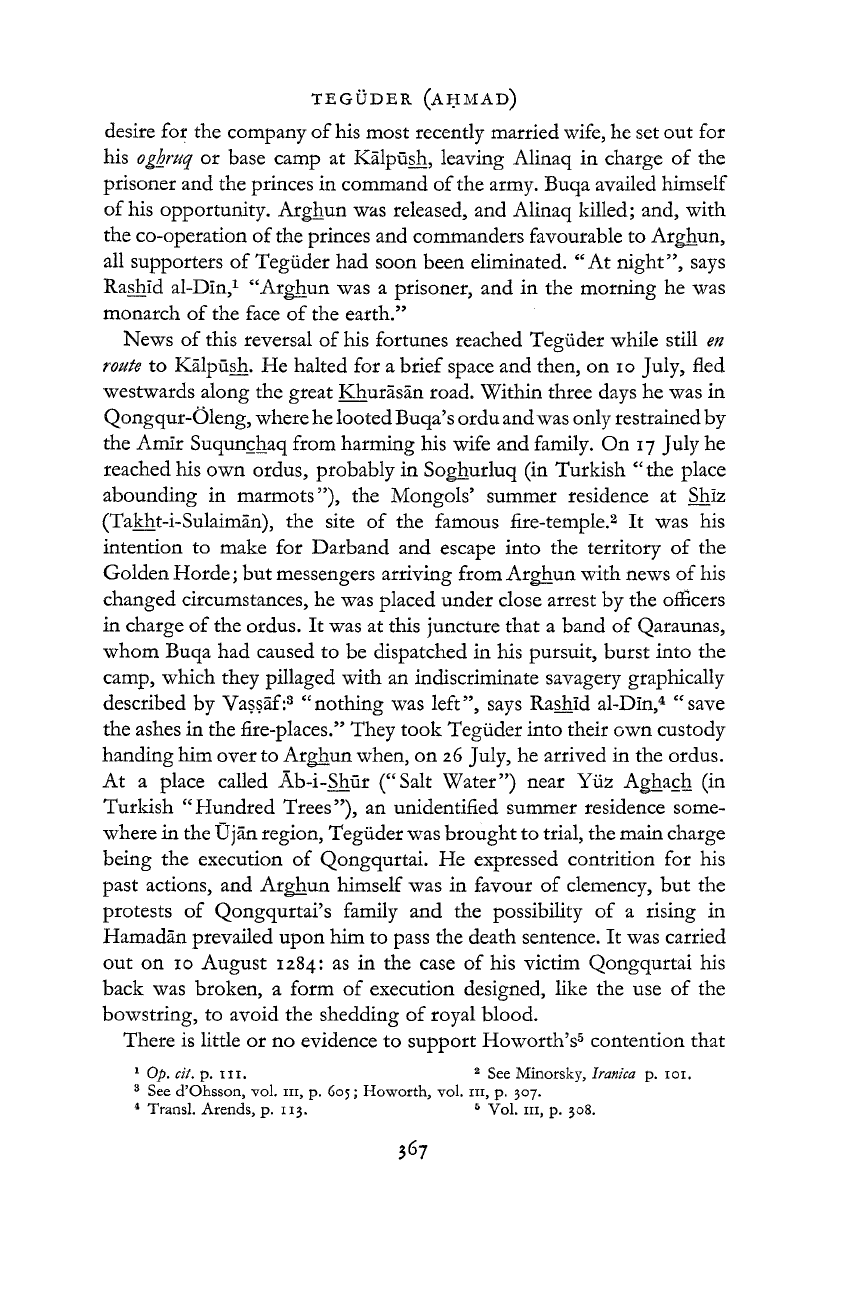
TEGÜDER (AHMAD)
desire for the company of his most recently married wife, he set out for
his oghruq or base camp at Kâlpüşh, leaving Alinaq in charge of the
prisoner and the princes in command of the army. Buqa availed himself
of his opportunity. Arghun was released, and Alinaq killed; and, with
the co-operation of the princes and commanders favourable to Arghun,
all supporters of Tegiider had soon been eliminated. "At night", says
Raşhid al-Din,
1
"Arghun was a prisoner, and in the morning he was
monarch of the face of the earth."
News of this reversal of his fortunes reached Tegiider while still en
route to Kâlpüşh. He halted for a brief space and then, on 10 July, fled
westwards along the great Khurasan road. Within three days he was in
Qongqur-Oleng, where he looted Buqa's ordu and was only restrained by
the Amir Suqunchaq from harming his wife and family. On 17 July he
reached his own ordus, probably in Soghurluq (in Turkish "the place
abounding in marmots"), the Mongols' summer residence at Shiz
(Takht-i-Sulaimân), the site of the famous fire-temple.
2
It was his
intention to make for Darband and escape into the territory of the
Golden Horde; but messengers arriving from Arghun with news of his
changed circumstances, he was placed under close arrest by the officers
in charge of the ordus. It was at this juncture that a band of Qaraunas,
whom Buqa had caused to be dispatched in his pursuit, burst into the
camp, which they pillaged with an indiscriminate savagery graphically
described by
Vaşşâf:
3
"nothing was left", says Raşhid al-Din,
4
"save
the ashes in the fire-places." They took Tegiider into their own custody
handing him over to Arghun when, on
26
July, he arrived in the ordus.
At a place called Âb-i-Şhür
("Salt
Water") near Yüz Aghaçh (in
Turkish "Hundred Trees"), an unidentified summer residence some-
where in the Üjân region, Tegüder was brought to trial, the main charge
being the execution of Qongqurtai. He expressed contrition for his
past actions, and Arghun himself was in favour of clemency, but the
protests of Qongqurtai's family and the possibility of a rising in
flamadan prevailed upon him to pass the death sentence. It was carried
out on 10 August
1284:
as in the case of his victim Qongqurtai his
back was broken, a form of execution designed, like the use of the
bowstring, to avoid the shedding of royal blood.
There is little or no evidence to support Howorth's
5
contention that
1
Op. cit. p. in.
2
See Minorsky, Iranica p. 101.
3
See d'Ohsson, vol. in, p. 605; Ho worth, vol. 111, p. 307.
4
Transl. Arends, p. 113.
5
Vol. 111, p. 308.
367
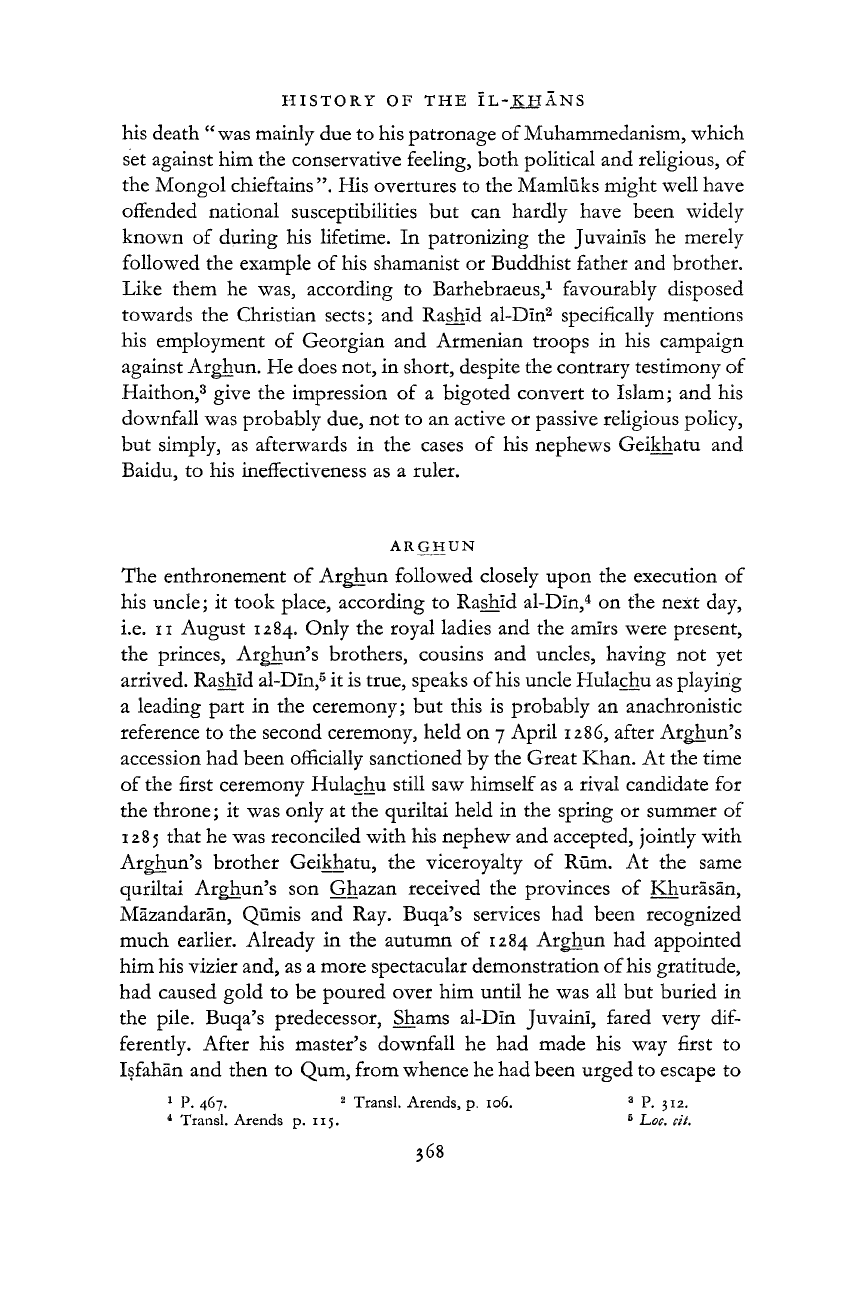
HISTORY OF THE IL-KHANS
his death " was mainly due to his patronage of Muhammedanism, which
set against him the conservative feeling, both political and religious, of
the Mongol chieftains". His overtures to the Mamluks might well have
offended national susceptibilities but can hardly have been widely
known of during his lifetime. In patronizing the Juvainis he merely
followed the example of his shamanist or Buddhist father and brother.
Like them he was, according to Barhebraeus,
1
favourably disposed
towards the Christian sects; and Rashid al-Din
2
specifically mentions
his employment of Georgian and Armenian troops in his campaign
against Arghun. He does not, in short, despite the contrary testimony of
Haithon,
3
give the impression of a bigoted convert to Islam; and his
downfall was probably due, not to an active or passive religious policy,
but simply, as afterwards in the cases of his nephews Geikhatu and
Baidu, to his ineffectiveness as a ruler.
ARGHUN
The enthronement of Arghun followed closely upon the execution of
his uncle; it took place, according to Rashid al-Din,
4
on the next day,
i.e.
II
August
1284.
Only the royal ladies and the amirs were present,
the princes, Arghun's brothers, cousins and uncles, having not yet
arrived. Rashid al-Din,
5
it is true, speaks of his uncle Hulachu as playing
a leading part in the ceremony; but this is probably an anachronistic
reference to the second ceremony, held on 7 April
1286,
after Arghun's
accession had been officially sanctioned by the Great Khan. At the time
of the first ceremony Hulachu still saw himself as a rival candidate for
the throne; it was only at the quriltai held in the spring or summer of
1285
that he was reconciled with his nephew and accepted, jointly with
Arghun's brother Geikhatu, the viceroyalty of Rum. At the same
quriltai Arghun's son Ghazan received the provinces of Khurasan,
Mazandaran, Qumis and Ray. Buqa's services had been recognized
much earlier. Already in the autumn of
1284
Arghun had appointed
him his vizier and, as a more spectacular demonstration of his gratitude,
had caused gold to be poured over him until he was all but buried in
the pile. Buqa's predecessor, Shams al-Din Juvaini, fared very
dif-
ferently. After his master's downfall he had made his way first to
Isfahan and then to Qum, from whence he had been urged to escape to
1
P. 467.
2
Transl. Arends, p. 106.
3
P. 312.
4
Transl. Arends p. 115.
5
Loc. cit.
368
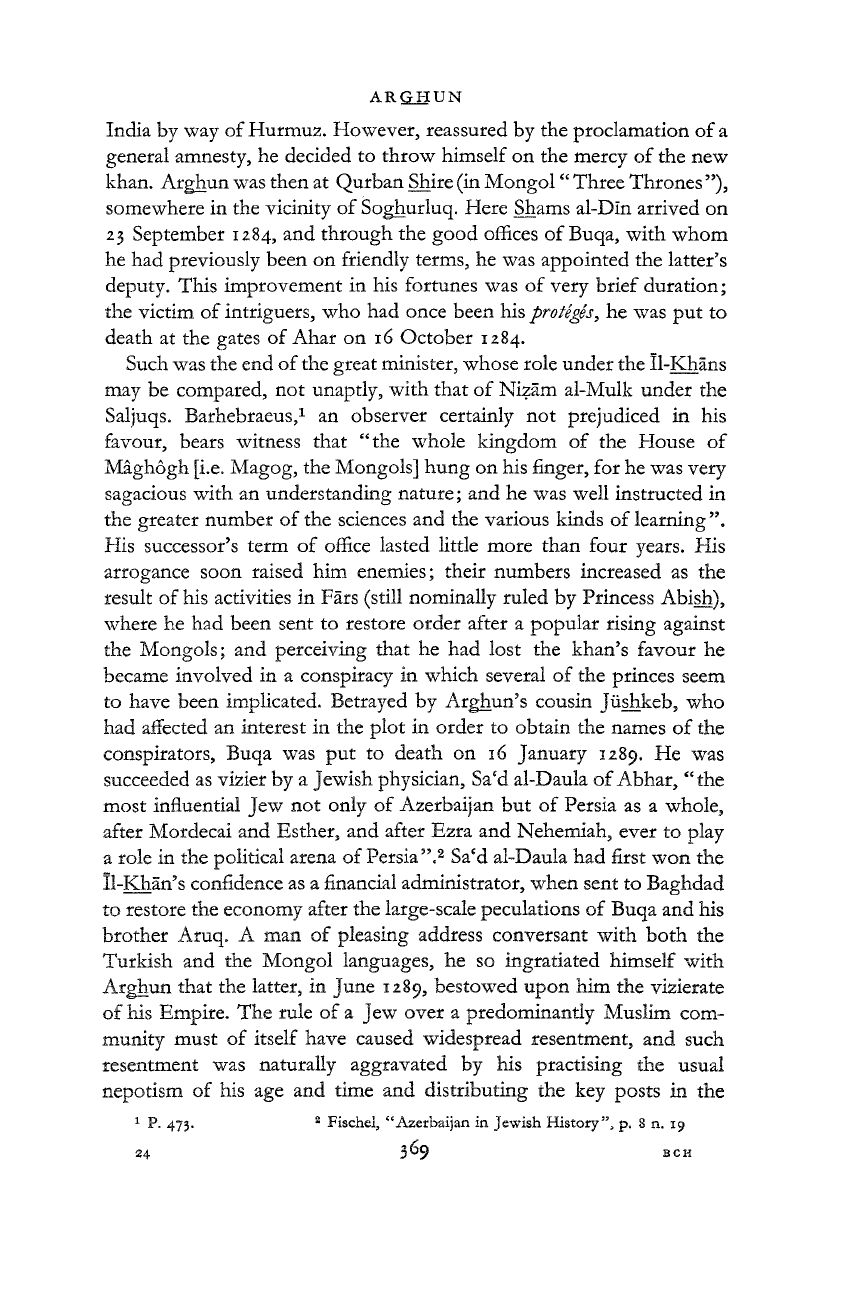
ARQHUN
India by way of Hurmuz. However, reassured by the proclamation of a
general amnesty, he decided to throw himself on the mercy of the new
khan. Arghun was then at Qurban Shire (in Mongol" Three Thrones
"),
somewhere in the vicinity of Soghurluq. Here Shams al-Din arrived on
23
September
1284,
and through the good offices of Buqa, with whom
he had previously been on friendly terms, he was appointed the latter's
deputy. This improvement in his fortunes was of very brief duration;
the victim of intriguers, who had once been his
proteges,
he was put to
death at the gates of Ahar on 16 October
1284.
Such was the end of the great minister, whose role under the Il-Khans
may be compared, not unaptly, with that of Nizam al-Mulk under the
Saljuqs. Barhebraeus,
1
an observer certainly not prejudiced in his
favour, bears witness that "the whole kingdom of the House of
Maghogh [i.e. Magog, the Mongols] hung on his finger, for he was very
sagacious with an understanding nature; and he was well instructed in
the greater number of the sciences and the various kinds of learning".
His successor's term of office lasted little more than four years. His
arrogance soon raised him enemies; their numbers increased as the
result of his activities in Fars (still nominally ruled by Princess Abish),
where he had been sent to restore order after a popular rising against
the Mongols; and perceiving that he had lost the khan's favour he
became involved in a conspiracy in which several of the princes seem
to have been implicated. Betrayed by Arghun's cousin Jiishkeb, who
had affected an interest in the plot in order to obtain the names of the
conspirators, Buqa was put to death on 16 January
1289.
He was
succeeded as vizier by a Jewish physician, Sa
c
d al-Daula of Abhar, "the
most influential Jew not only of Azerbaijan but of Persia as a whole,
after Mordecai and Esther, and after Ezra and Nehemiah, ever to play
a role in the political arena of Persia".
2
Sa
c
d al-Daula had first won the
Il-Khan's confidence as a financial administrator, when sent to Baghdad
to restore the economy after the large-scale peculations of Buqa and his
brother Aruq. A man of pleasing address conversant with both the
Turkish and the Mongol languages, he so ingratiated himself with
Arghun that the latter, in June
1289,
bestowed upon him the vizierate
of his Empire. The rule of a Jew over a predominantly Muslim com-
munity must of itself have caused widespread resentment, and such
resentment was naturally aggravated by his practising the usual
nepotism of his age and time and distributing the key posts in the
1
P. 473.
2
Fischel, "Azerbaijan in Jewish History", p. 8 n. 19
24
369 BCH
